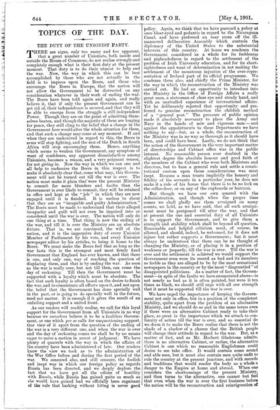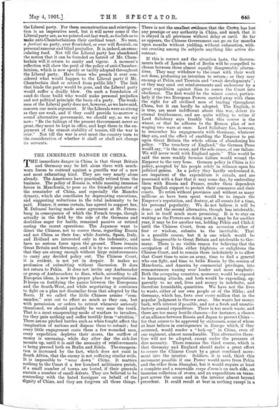TOPICS OF THE DAY.
1.1:Lel DUTY OF THE UNIONIST PARTY. THERE are signs, only too many and too apparent, that a great number of Unionists, both inside and outside the House of Commons, do not realise strongly and completely enough what is their first duty at the present moment. That duty is to do their utmost to help end the war. Now, the way in which this can be best accomplished by those who are not actually in the field is to impress upon the Boers, and those who encouraae the Boers in Europe, that the nation will not allow the Government to be distracted on any consideration whatever in their work of ending the war. The Boers have been told again and again, and really believe it, that if only the present Government can be got rid of, their independence is secured, and that they will be able to emerge from the struggle a still independent Power. Though they are on the point of admitting them- selves beaten, and though the majority of them are longing for peace, they still cling to the belief that a change in the Government here would alter the whole situation for them, and that such a change may come at any moment. If and when they are undeceived in regard to this, the Boers in arms will stop fighting, and the rest of the Dutch in South Africa will stop encouraging them. Hence, anything which seems to weaken the Government, any symptom of want of confidence, any apparent dissatisfaction among Unionists, becomes a reason, and a very poignant reason, for not giving in. Now the way in which we can one and all help to undeceive the Boers in this respect is to make it absolutely clear that, come what may, this Govern- ment will not be turned. out till the war is over. The nation must make it plain that' were the present Ministry to commit far more blunders and faults than the Government is ever likely to commit, they will be retained in' office and kept, at the " job " in which they are now engaged until it is finished. It is useless to shout that they are an "incapable and guilty Administration." The Boers must be made to understand that their alleged incapacity and guilt will not even be inquired into or considered until the war is over. The nation will only do one thing at a time. That thing is now the ending of the war, and till it is over the Ministry are an absolute fixture. That is, we are convinced, the will of the nation, and it is the imperative duty of every Unionist Member of Parliament by his vote, and every Unionist newspaper editor by his articles, to bring it home to the Boers. We must make the Boers feel that as long as the war lasts this is the strongest and most firmly fixed Government that England has ever known, and that there is one, and only one, way of reaching the question of displacing them, and that is by ending the war. As soon as the war is really over, but not till then, can come the day of reckoning. Till then the Government must be supported with a loyalty which must be absolute. The fact that such loyalty is often based on the desire to finish the war, and to concentrate all efforts upon it, and not upon the belief that the Government has done specially well in the past, or is going to do specially well in the future, need not matter. It is enough if it gives the result of an unfailing support and a united front.
As our readers will readily realise, we call for this loyal support for the Government from all Unionists in no way because we ourselves believe it to be a faultless Govern- ment, or one which per se calls for unquestioning support. Our view of it apart from the question of the ending of the war is a very different one, and when the war is over and the day of reckoning comes we shall be' by no means eager to move a motion in arrest of judgment. We have plenty of quarrels with the way in which the affairs of the country have been administered of late. Our readers know the view we took as to the administration of the War Office before and during the first period of the war. We censured also, and still' censure, the foolish and inept way in which our foreign policy as regards Russia has been directed, and we deeply deplore the fact that Ise have got all the odium of hostility with Russia, while Russia has gained quite as much as she would have gained had we officially been cognisant of the rule that barking without biting is never good policy. Again, we think that we have pursued a policy at once blear-eyed and pedantic in regard to the Nicaraguan Canal, and have preferred. an easy score off the mannered deliberative Assembly which controls the diplomacy of the United States to the substantial interests of this country. At 'home we condemn the Government considered as a whole for its feebleneAs and pigheadedness in regard to the settlement of the problem of Irish University education, and for its short- sightedness and want of determination in not making the settlement of the monstrous injustice of the over-repre- sentation of Ireland part of its official programme. We condemn them also, and chiefly. the Prime Minister, for the way in which the reconstruction of the Ministry was carried out. He had an opportunity to introduce into the Ministry in the Office of Foreign Affairs a really great man, a statesman of clear eye and steady hand, and with an unrivalled experience of international affairs. Yet he deliberately rejected that opportunity and pre- ferred to genuine reconstruction the • childish method of a " general post." The pressure of public opinion made it absolutely necessary to place the Army and Navy in the hands of new and vigorous men — and against the appointments to these Departments we have nothing to say—but, as a whole, the reconstruction of the Ministry was in no way as thorough as it should have been, and could have been. Lastly, we do not think that the action of the Government in the very important matter of directorships and Cabinet office was in the public interest. No reasonable person ever doubted in the slightest degree the absolute honour and good faith of the members of • the Cabinet who were both Ministers and directors, but to base a general rule and settle a consti- tutional custom upon those considerations was most inept. Because a man trusts implicitly the honesty and fidelity of his servants in a particular year, he does not make it a rule of his house that there is to be no lock on the cellar-door, or on any of the cupboards or bureaux.
But though we have our own quarrel with the Administration, and though when the proper time comes we shall gladly see them arraigned on many counts, we hold, as we have said, that all such arraign- ment must be postponed till after the war, and that at present the one and essential duty of all Unionists is to support the Government, and to give them a strength and stability which shall be beyond all question. Reasonable and helpful criticism must, of course, be allowed, and should, indeed, be welcomed, for it does not injure but rather supports a Government; but it must always be understood that there can be no thought of changing the Ministry, or of placing it in a position of weakness or jeopardy, till the war is over. Till the war-is over and the settlement is achieved. we would. support the Government even were its record as bad and its members as feeble as they are alleged to be by the most sensational newspapers in the country or by the most " disgruntled " of disappointed politicians. As a matter of fact, the Govern- ment—in spite of the faults we have enumerated above—is not nearly as bad as it is often painted, but were it ten times as black, we should still urge with all our strength that it must be supported till the war is over.
We have urged the importance of keeping the Govern- ment not only in office, but in a position of the completest stability, quite apart from the problem of an alternative Ministry, and we should do so and in the same terms even if there were an alternative Cabinet ready to take their place, so great is the importance which we attach to con- tinuity of action till the war is over, and so essential -do we deem it to make the Boers realise that there is not the shade of a shadow of a chance that the British people will change their attitude in regard to the war. But, as a matter of fact, and as Mr. Herbert Gladstone admits, there is no alternative Cabinet, or rather, the alternative Cabinet is one which . no reasonable Englishman could desire to see take office. It would contain some sound and able men, but it must also contain men quite unfit to rule the country at the present juncture, and with records and traditions that would. render the body as a whole a danger to the Empire at home and abroad. When one considers the shortcomings ' of the present Ministry, and then turns to ' the alternative, one cannot but feel that' even when the war is over the first business before the nation will be the reconstruction and reinvigoration of the'Liberal party. : For them reconstruction and reinvigora- tion is an imperative need, but it will never come if the Liberal party are, as we pointed out last week, so foolish as to make anti-Chamberlainism their cardinal tenet. No man, a fortiori no party, ever flourished, or ever will flourish, on personal rancour and blind prejudice. It is, indeed, an emas- culating food. Not till the Liberal party has abandoned the notion that it can be founded on hatred of Mr. Cham- berlain will it return to sanity and vigour. A moment's reflection will show the peril of the policy of anti-Chamber- lainism, which is now openly or tacitly adopted throughout the Liberal party. Have those who preach it ever con- sidered what would happen to the Liberal party if Mr. Chamberlain died or retired from public life ? The link that binds the party would be gone, and the Liberal party would suffer a deadly blow. On such a foundation of sand do those build who would make personal prejudice and not political principle the basis of a party. The weak- ness of the Liberal party does not, however, as we have said, -concern our main argument. If the Liberals were as strong as they are weak, and if they could provide to-morrow a sound alternative government, we should say, as we say now: "Be the failings of the present Government never so great, they must be kept in office, and kept there in the en- joyment of the utmost stability of tenure, till the war is over." Not till the war is over must the country turn to the consideration of whether it shall or shall not change its servants.











































 Previous page
Previous page